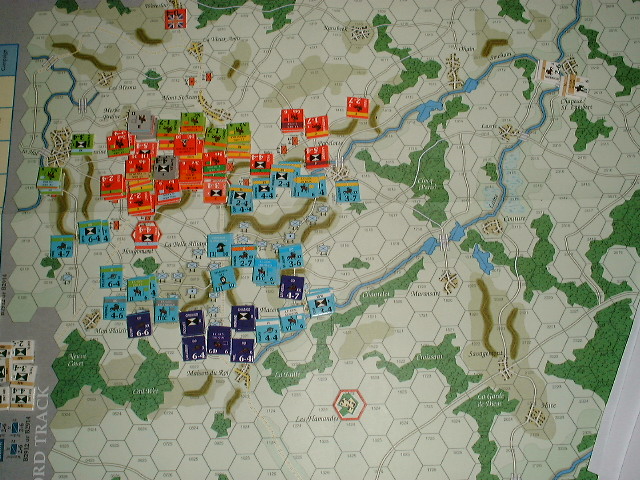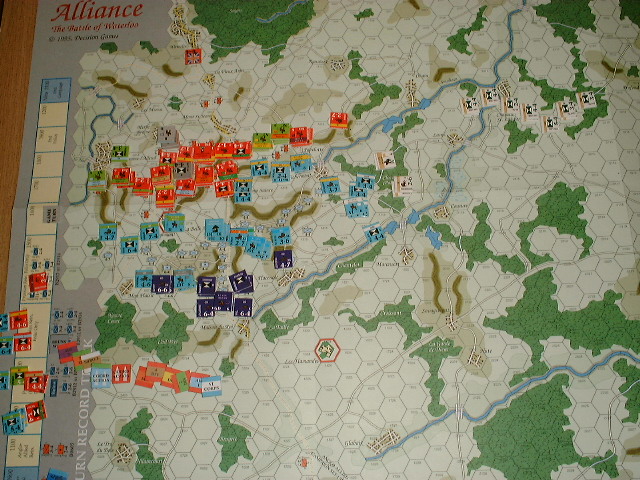Markus Stumptner - Mar 14, 2006 4:03 am (#592 Total: 597)
De vonstig in der Schlondo ven -- how you say -- "groovy"
La Belle Alliance replay - Part I
Just realised that I apparently never posted a replay of the NLB La
Belle Alliance scenario that I wrote up late in 2002 after the first
test game of the scenario with my variant rules. (Note that this wasn't
the first test, I had already run through Quatre Bras, Ligny, and Wavre
a varying number of times.) So, here goes. Note though that this was
done with an early version of the rules so there may be minor
differences to the way the current rules work. I actually have an old
Quatre Bras replay as well - will post that later.
Initial orders: All British troops have Defend orders. Buelow, once he
arrives, has March and Attack orders towards Plancenoit. (Ziethen would
have March and Attack orders towards Smohain and then La Belle Alliance,
but is not in the originally published scenario although his troops
attacked before the French collapse - this has only been slowly
acknowledged in newer sources.) D'Erlon has Attack orders towards
Papelotte/La Haye Sainte and on into Mont St Jean, Reille has Attack
orders towards Hougoumont and on into Merbe Braine and Waterloo, all
other French formations are in Reserve.
1200 The game starts with Napoleon getting an Initial Action and moving
d'Erlon. I Corps attacks, with some good dierolls smashes Vincke's
weakened brigade, and sends Best and Pack reeling, although at the cost
of losses to Nogues and Bourgeouis (the latter covering the flank
towards La Haye Sainte). No French troops cross the crest as yet because
that would leave them too exposed, but given the apparent effortlessness
of the advance, I thought, oops, are the French through already?? At
that moment, Ponsonby launched a reaction charge, rolled a 12, and
though with some losses of his own, routed the 2nd Division - Schmitz's
and Aulard's brigades chased off the field. Ponsonby pursued and
attacked the 3rd division but this time to little effect and retired
behind the British line. Next to activate is the 5th Division, Pack
rejoins the line and counterattacks, no losses on either side (lucky for
Pack actually, as he's facing Nogues and most of the I Corps artillery).
By now it's II Corps' turn. The 6th division attacks Mitchell, west of
Hougoumont, as yet not to much effect. Byng is attacked by no less than
15 strength points. Though the Chateau softens this to 8 he still
suffers a loss, but (DR10) dishes out 2 of his own. Reille decides to
retreat, but still loses the remains of Husson's brigade (which started
the battle on the reverse side due to losses at Quatre Bras). On
Wellington's left, Fraser's horse artillery fills the gap. The rest of
Cole's division comes up.
1300. Napoleon has a sense of foreboding and sends an order to Lobau to
march and delay in the direction of the Bois de Clocq. Lobau, still in
reserve, accepts immediately and will start moving. Napoleon also gets
the Initial Action chit again, which again goes to d'Erlon. Grenier
pushes Bijlandt back behind the crest, Nogues, supported by I Corps
artillery, vaporizes Best's brigade, and Brue and Pegot's men eliminate
Weimar's brigade (DR 11) and take Papelotte. Ompteda's men suffer some
losses in La Haye Sainte, but retain control. After the shock of the
British cavalry charge last turn, this hour is more to d'Erlon's taste
so far. Meanwhile, VI Corps gets underway. Now Cole sends in Lambert and
his artillery to counterattack against Papelotte, and rather than see
both Brue and Pegot's brigade mauled, d'Erlon falls back. Brue's men
still take losses in the confused street fighting.
Meanwhile, on the horizon, Buelow's cavalry vanguard appears. (Actually,
they're not in LOS yet for a long time, so strictly speaking they're not
in sight.
On the French left, Reille attacks again, his corps artillery mauls
Mitchell's men and the 6th Division tramples them into the mud. A second
assault against Hougoumont means Campi's brigade is hors de combat on
the French side, but Byng's men start to suffer. Might be time to
reinforce or replace them, but unfortunately Maitland is looking the
other way. (His chit was pulled just before.) Ponsonby charges Grenier
on the left Allied wing but with little effect this time.
Images: the situation immediately before 1400. (Lower picture is a
close-up.)


Markus Stumptner - Mar 15, 2006 12:37 am (#595 Total: 597)
De vonstig in der Schlondo ven -- how you say -- "groovy"
La Belle Alliance replay - Part 2
1400. The attacks continue. No Initial Action Chit this time (Wellington
rolls 3, Napoleon 4). And the turn starts with Buelow's Corps swinging
into view, still at least 3 hours' march away.
Cole would love to start a spirited counterattack from Papelotte, but is
not permitted to as per the Defend orders handed out by Wellington.
Reille continues his attacks on Hougoumont and finally manages to break
in and take it. A major success! The main problem is that apart from the
Guard, there are virtually no reserves on the left wing to exploit it.
Reille's strength is down to 22, Kellermann's 11. Together they face 42
strength points west of Mont St Jean. Of course that is if Wellington
does not move additional troops from here to the left wing to stop
d'Erlon. Is it already time to commit the Guard?? Perhaps Reille should
soften up the defenses behind Hougoumont first.
Meanwhile the battle continues to develop further east as well. VI Corps
takes up a strong blocking position behind the Bois de Clocq. The
attacks on La Haye Sainte continue with little vigor, but Cole's troops
defending Papelotte take severe losses (2 steps) while Pegot's Brigade
is eliminated. d'Erlon now is one strength point below the
demoralization limit, with 25 strength remaining. Directly facing him
are 20 points of Allied troops, but another 20 are arrayed in the center
behind La Haye Sainte.
1500. Napoleon decides not to commit the Guard yet. Neither side gets an
Initial Action, but both get a Coordinated Action chit. Napoleon can't
do much with it, gives it to I and II Corps, but Wellington uses it for
the Nassauers (N2) and 5th division for a coordinated counterattack.
Wellington brings the Dutch cavalry in position behind the crest on his
left wing. Far away to the east, the rest of Buelow's corps appears, and
the vanguard of the infantry is marching through Chapelle St Lambert,
with the church spire of Lasne coming in sight. Reille brings
Pelletier's artillery in position to the west of Hougoumont. d'Erlon
continues the attack, and while La Haye Sainte continues to occupy the
attention of Bourgeouis and Quiot, Grenier's brigade manages to push
Pack and Bijlandt back and get across the crest. This was probably an
error, only the Allies suffered a loss and could have weathered
Bijlandt's elimination, but I decided not to do it and to retreat
instead, since I had the Dutch cavalry and Vandeleur's brigade arranged
for a massive counterattack. Unfortunately they all miss their morale
roll (6,6,5) and so will have to charge piecemeal. Four other brigades
of d'Erlon's corps supported by the corps artillery attack Papelotte
again. They gain two losses (strength of 10 reduced to 7, DR 8 ) while
suffering one (strength of 4, DR 7). Now it's d'Erlon's decision. Should
he ease the pressure, retreat and avoid the demoralization of his corps
(which would see him stop the attack with a 2/3 probability on the next
turn)? This would still weaken the defenders, but leave some alive in
the town. If he presses the attack, it's decision time for Cole. If Cole
does not retreat, his troops in Papelotte will be annihilated and the
town will fall unless d'Erlon's troops retreat involuntarily (a 1/3
chance). It does seem advantageous to press the attack (as it should be
with a 2:1 loss ratio), and that is what d'Erlon does. Cole decides to
retreat rather than be destroyed to delay the capture by an hour, and
the town falls.
A joint counterattack (the Coordinated Action chit) by Pack's and
Bijlandt's brigade on Grenier does not bring any advantage. With Buelow
now providing a kind of flank guard, Wellington moves Vivian's brigade
close in to support a possible larger cavalry attack next turn. Despite
the heavy activity, few losses due to the defenders' decisions to fall
back.



